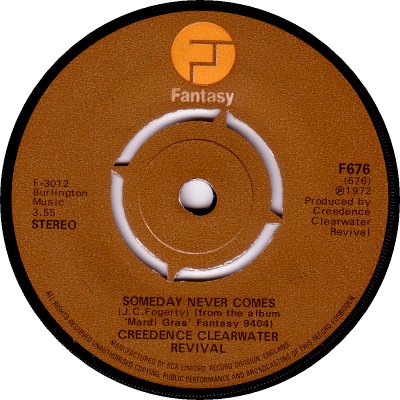
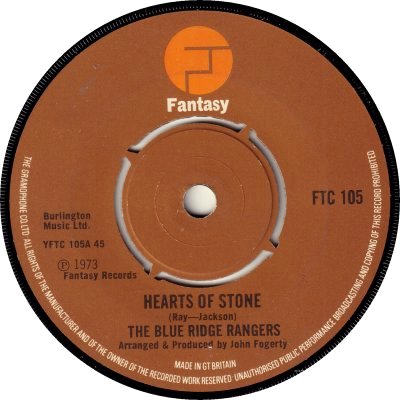
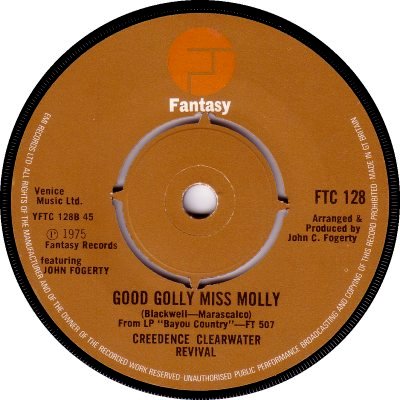
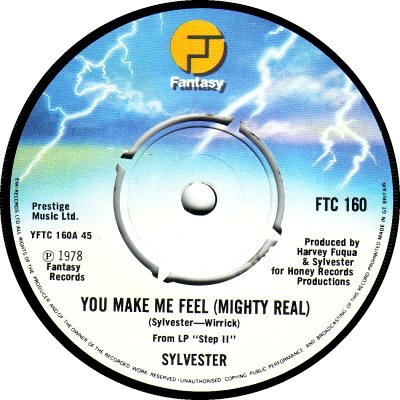
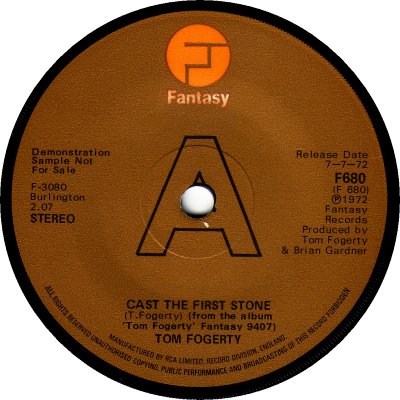
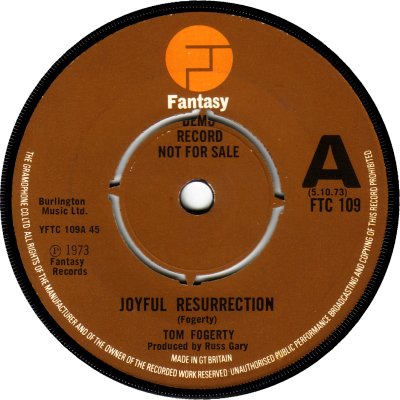
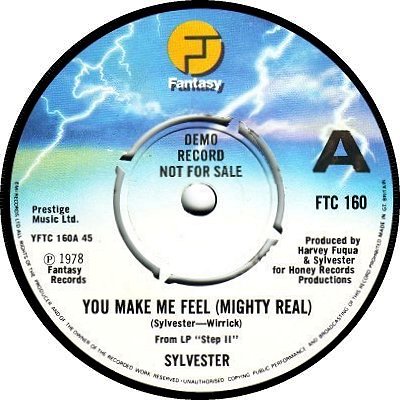
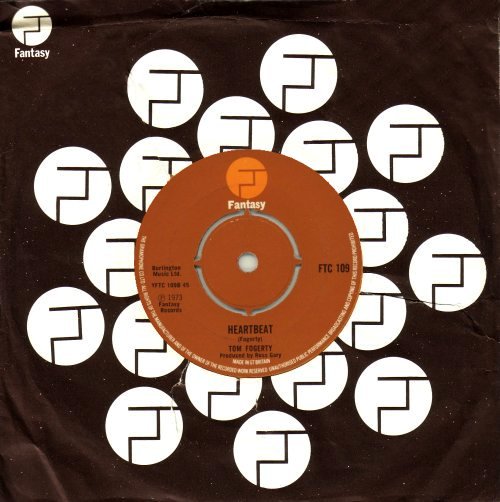
American, initially out of San Francisco, later out of Berkeley. The origins of Fantasy lie in a pressing plant called Circle Records, which was launched in the 1940s by brothers Max and Sol Weiss. They encountered Jazz pianist Dave Brubeck as a result of pressing records of his on Jack Sheedy's Coronet label; they signed him and started the Fantasy record label in 1950 as an outlet for his recordings ('Billboard', 6th May 1967). Brubeck moved to Columbia in 1954 but his new contract stipulated that if that company didn't care for some of his more experimental material he was free to place it with Fantasy ('BB', 14th April). By that time Fantasy had developed into a fully fledged independent Jazz label - an advert from later in the year featured several additional names that would become well-known in that field, including those of Cal Tjader, Gerry Mulligan, Paul Desmond, Chet Baker and Red Norvo ('BB', 16th October).
Saul Zaentz joined Fantasy in the spring of 1955 as national sales manager ('BB', 12th March), a development that would have considerable importance later on. The company began to make its mark, and by the summer of 1957 'BB' of the 19th of August was able to say that while it was regarded as a rather unorthodox operation it had proved itself able to compete with the majors at every level, including talent, packaging, merchandizing and sales. The final quarter of 1958 was the best that Fantasy had had, in terms of sales, and in an effort to keep the impetus up the company intended to start issuing albums in stereo as well as in mono ('BB', 19th January 1959). By that time Fantasy was broadening its scope. It enjoyed success with a series of controversial comedy LPs by Lenny Bruce, and in 1961 the short-lived Jazz subsidiary, Galaxy, was revived briefly as a Gospel outlet. Galaxy was re-revived, much more successfully, the following year. 'BB' of the 21st of July 1962 claimed that Fantasy was going to place R&B, Pop and Folk on it in the future, but in actual fact it settled down to serving as an R&B label. Little Johnny Taylor provided it with a best-seller when his 'Part Time Love' b/w 'Somewhere Down The Line' made No.1 in Billboard's R&B Chart in 1963. Fantasy itself remained primarily a Jazz / Latin concern until the second half of the 1960s, developing a catalogue of albums by the likes of Brubeck, Cal Tjader and Vince Guaraldi which sold steadily over time rather than spectacularly all at once ('BB', 24th April 1965).
The Weiss brothers certainly had ambitions for Fantasy. 'BB' of the 1st of December 1962 revealed that they were building a studio, and in addition to that they moved into the field of distribution, handling other companies' records as well as their own - 'BB' of the 18th of May 1963 observed that they had signed a deal with H.B. Barnum to distribute his three labels. Fantasy's success made it a tempting target for a takeover, and at the very end of 1966 'BB' of the 31st of December quoted 'reliable sources' as saying that Herman Gimbel's Audio Fidelity firm had bought the company. According to the article, contracts had been signed, Orrin Keepnews was lined up to be the vice president of A&R, and a move to New York was in the offing. The information turned out to be not quite accurate. A deal had been agreed, but it hit terminal problems, and 'BB' of the 26th of March 1967 broke the news that it had fallen through at the last moment, with Audio Fidelity claiming that Fantasy had failed to provide important assets, including Dave Brubeck masters. Audio Fidelity ended up taking the Weisses to court. It claimed that a written contract had been entered into, the price and royalties had been agreed, and a $5,000 down-payment had been paid; then at a meeting in March, Fantasy had failed to deliver what it had promised. The accusation was that Fantasy had claimed to have certain interests in Brubeck, Mulligan, Norvo and others when it did not. Damages of $95,000 were being sought, for lost business and so forth. Subsequent Billboards failed to mention the matter again, so presumably it was settled out of court. Around the same time, in a spotlight on the San Francisco music scene, Fantasy was described as being up to its knees in Rock 'n Roll groups; it was also, according to the feature, accustomed to developing artists only for them to be lured away by other companies.
The autumn of 1967 saw a group of seven distributors managing to do what Audio Fidelity had failed to do in the spring: they purchased Fantasy from the Weiss brothers. Saul Zaentz, formerly Fantasy's head of sales, headed the new ownership group. The Galaxy label and Fantasy's publishing were included in the deal, but the Weisses kept the studio with the intention of producing records independently ('BB', 7th October). For a while Fantasy struggled under its new owners - in 'BB' of the 3rd of May 1969 Zaentz reflected that eight months ago it had been 'really scrambling'. Happily, by the time of that article its fortunes had changed: it had stumbled upon a real money-maker in the form of Creedence Clearwater Revival, who had previously recorded unsuccessfully for the company as 'The Golliwogs'. The band had provided three gold records, and had supplied Fantasy with its first million-seller, in the form of 'Proud Mary'. As a result there had been a turn-around. At the time of the purchase Fantasy had been primarily a Jazz label, with three artists on its roster and four full-time staff, but the staff numbers had increased to nearly a dozen and the roster had grown to eight to ten groups with another couple of signings in the pipeline. Creedence continued to do the business. 'BB' of the 24th of May 1969 noted that in addition to scoring two gold albums they had set attendance records in half-a-dozen recent concert appearances; while 'BB' of the 9th of January 1971 commented admiringly that the band had been top of its cumulative LP Charts for the past year and had outsold The Beatles.
Fantasy's revival continued in the early '70s. 'BB' of the 14th of November 1970 reported that the company was moving to new premises in Berkeley but that it was striving to preserve its current family atmosphere - Zaentz was quoted as saying that he wanted it to stay small enough for it to act quickly if it needed to do so. It made a foray into Classical music - its second, apparently - in 1971; according to 'BB' of the 15th of May, Nathan Rubin was to be in charge and the object was to concentrate on 'untapped' areas - the popularity of composers such as John Cage, Terry Reilly and Morton Subotnik was mentioned, as was the growing interest in electronic music. A month or so later came the news that Fantasy had formed a film unit ('BB', 12th June), which concentrated at first on making promotional films of Fantasy artists. It proved successful and was expanded later in the year ('BB', 20th November). The company's Jazz interest were not forgotten, however. The rights to the Prelude label were gained, for the USA and Canada, and a series of 'Twofer' - double albums for the price of a single album - reissues were planned ('BB', 19th June 1971).
A sign of Fantasy's growing confidence was the move to give the label its own identity worldwide, which was announced in 'BB' of the 6th of May 1972. In addition, a change of label design was to take place. The same year, a diversification program saw the company move into the movie business, and it provided part of the funding for the 'Fritz The Cat' cartoon. On the Jazz front, Fantasy boosted its catalogue by acquiring the rights to the Riverside label; Orrin Keepnews, who had joined Fantasy recently, was put in charge of the new acquisition ('BB', 4th November 1972). Another classic Jazz label, Milestone, was brought on board a month or so later, leaving Fantasy as 'the front-runner in Jazz repertoire domestically', as 'BB' of the 2nd of December put it. Less good news came when Creedence Clearwater Revival broke up; the band's members remained under contract individually, however, and would continue to work on writing, production and recording ('BB', 28th October). The new arrangement seems to have been less than satisfactory. The contracts eventually expired at midnight on December 31st 1974, by which time, according to 'BB' of the 22nd of February 1975, the company and the individuals concerned had been 'extremely at odds' for some time.
Fantasy's involvement in the movie industry grew in 1973. It produced 'Paydirt', about a Country music star ('BB', 3rd February), and went on to finance 'One Flew Over The Cuckoo's Nest', which 'BB' of the 5th of May said was to be produced by Saul Zaentz himself. The following few years were decent ones for Fantasy. 'BB' of the 19th of March 1977 was able to say that 1976 had been the best grossing year for the company since the days when Creedence were shifting tons of records, and that it had established a solid Chart presence in the fields of Jazz, Soul and Pop-Rock thanks to artists such as The Blackbyrds, Stanley Turrentine and David Bromberg. An important addition came in 1977 when the rights to the recently-defunct Stax Records were acquired. A reissue program was undertaken, but the intention was to revive Stax as a living label; as an aid to the revival Fantasy opened an office in Memphis, Stax's home town ('BB', 5th November). The final two years of the Seventies saw the flourishing of Disco music. Fantasy rode the wave, got several artists into the Charts, and scored a 'Best Male Disco Artist' award with Sylvester ('BB', 11th August 1979). There was something of a reaction against the genre towards the end of the decade, however, and 'BB' of the 28th of April 1979 reported that Fantasy was aiming to broaden its market: 90% of its artists were R&B or Disco, and A&R staff were actively looking for Rock, Pop, AOR and potential Top 40 acts. The '80s are beyond the reach of this site, thank goodness, but Fantasy continued to accumulate the back-catalogues of other labels - Contemporary / Good Time Jazz, and Pablo - during that decade, while in the '90s Specialty, Takoma and Kicking Mule came on board. Zaentz sold the company to Concord Records in June 2004, but under its new ownership it continued to be active, both in the field of reissues and of new recordings.
For a label that made such a big impact in its home land, Fantasy made a surprisingly small impression in Britain. Brand recognition wasn't helped by the fact that it licensed Creedence Clearwater Revival's records to Liberty in the late '60s and early '70s, with the result that of the band's nine hits eight were on Liberty and one on United Artists. All of them had a production credit to Fantasy on their labels. 'Bad Moon Rising' b/w 'Lodi' (LBF-15230; 8/69) was the most successful of them, reaching the coveted No.1 spot. Other Fantasy artists to have records out on Liberty were Clover and Betty Everett, while Redwing's 'California Blues' b/w 'Dark Thursday' surfaced on United Artists in May 1971, as UP-35207. The album from which those two tracks were taken, 'Redwing', also came out on United Artists (UAS-29188; 1971). From the late '50s into the mid '60s a lot of Fantasy's Jazz product was picked up by Decca and issued on their Vogue and later Vocalion labels here, again with a production credit, but it wasn't until 1972 that Fantasy appeared on these shores in its own right. The licensing deal with United Artists / Liberty expired in February 1972, UA being apparently unwilling to agree to the £180,000 renewal price ('Music Week', 25th March). A replacement three-year licensing deal was agreed with RCA, enabling that company to release both Fantasy and Prestige material ('BB', 22nd April). As a result the first Fantasy-labelled records appeared.
Under the arrangement with RCA Fantasy put out three albums and two singles, Creedence's 'Someday Never Comes' b/w 'Tearin' Up The Country' (F-676; 6/72) and 'Cast The First Stone' b/w 'Lady Of Fatima' by Tom Fogerty (F-860; 7/72), using an 'F' prefix for the singles, followed by their American catalogue numbers (1, 5). The arrangement turned out to be short lived, however. 'Music Week' of the 11th of November broke the news that Fantasy had switched to EMI under a three-year licensing deal after only eight months at RCA. According to the article the deal between Fantasy and RCA had never actually been signed, and the parting was by mutual agreement. Prestige was to stay with RCA.
Fantasy remained with EMI until the autumn of 1980. It adopted an FTC-100 numerical series for its singles, and after not having much success with them for a couple of years finally got into the Charts with 'Walking In Rhythm' b/w 'The Baby' by The Blackbyrds (FTC-114; 3/75), which stalled at No.23. A year later Rodger Collins took 'You Sexy Sugar Plum' b/w 'I'll Be Here' (FTC-132; 3/76) one place higher. The company really got into its stride, in Chart terms, during the Disco boom of the late '70s. Admittedly, huge hits were lacking, but Sylvester reached No.8 with 'You Make Me Feel (Mighty Real)' b/w 'Was It Something I Said' (FTC-160; 7/78), and Slick's 'Space Bass' b/w 'The Whole World Is Dancing' (FTC-176; 5/79) made it as high as No.16. Sylvester managed three more, lesser, hits, and Slick's follow-up was a minor success; other Fantasy artists to take singles into the lower reaches of the Top 50 were Phil Hurtt and Fat Larry's Band, the latter also registering under the shortened name of FLB.
The eventual subsiding of the Disco phenomenon seems to have left Fantasy at something of a loose end, as witness the 'BB' report from April 1979 quoted above. Matters may not have been helped by events at EMI. In January 1980 EMI's Licensed Repertoire Division was closed, and, according to 'MW' of the 26th of January, chaos followed. From the end of the month eight of EMI's licensed labels, including Fantasy and its associate Stax, were transferred to the care of Liberty-United Artists. The new arrangement reportedly didn't meet with the approval of all of the clients, and Fantasy may well have been among the dissatisfied parties. Whatever the reason, by the end of the year it had left EMI. As its Prestige and Milestone imprints were still at RCA, Fantasy still had a link with that company, and 'MW' of the 13th of September 1980 revealed that certain Fantasy product was to be placed with RCA, though a full licensing deal had yet to be agreed. Fantasy records began to emerge via RCA the following month, but they were much reduced in number. 1979 had seen 20 singles issued, but there were only 5 in 1980 and another five in 1981. The company's 200th FTC-prefixed single, 'That's A Lady' b/w 'Electrophonic Phunk' by Shock USA, proved to be its last in the UK, and was the only 7" release in 1982 - it came out in July. Fantasy continued to put singles out in its homeland but none of them surfaced on that label over here.
The first UK Fantasy label, brown with an orange logo (1), was less exotic than the one that was currently in use in the States; it was adopted there in late November 1972. It remained basically unchanged after the move from RCA to EMI, though the perimeter text altered (2). There was a further change in that text in March 1975 from FTC-114 onwards: the reference to 'The Gramophone Co' at 9 o'clock was replaced by one to EMI Records, and the 'Made in Great Britain' at the bottom migrated to 2 o'clock (3). A similar change took place on most of the other labels in the EMI family, but Fantasy's happened some eighteen months or so after the others - perhaps stock of the old labels was being used up. In May 1978, with FTC-157, the brown label was replaced by a more zingy multicoloured one (4), which lasted until the end.
Demo copies from the first RCA period were marked with a hollow central 'A' and the appropriate text (5). After the move to EMI they were overprinted in that company's usual fashion (6, 7). The company sleeve dates from the brown-label EMI years; there aren't many of them around, nowadays, and I suspect that they were restricted to the first nine or ten issues. Subsequent singles came in EMI's all-purpose plain white sleeves. The discography below only covers the 1970s; the 'EMI-LRD' refers to EMI's Licensed Repertoire Division, which existed as a separate entity for a couple of years and handled all of EMI's licensed product during that time.
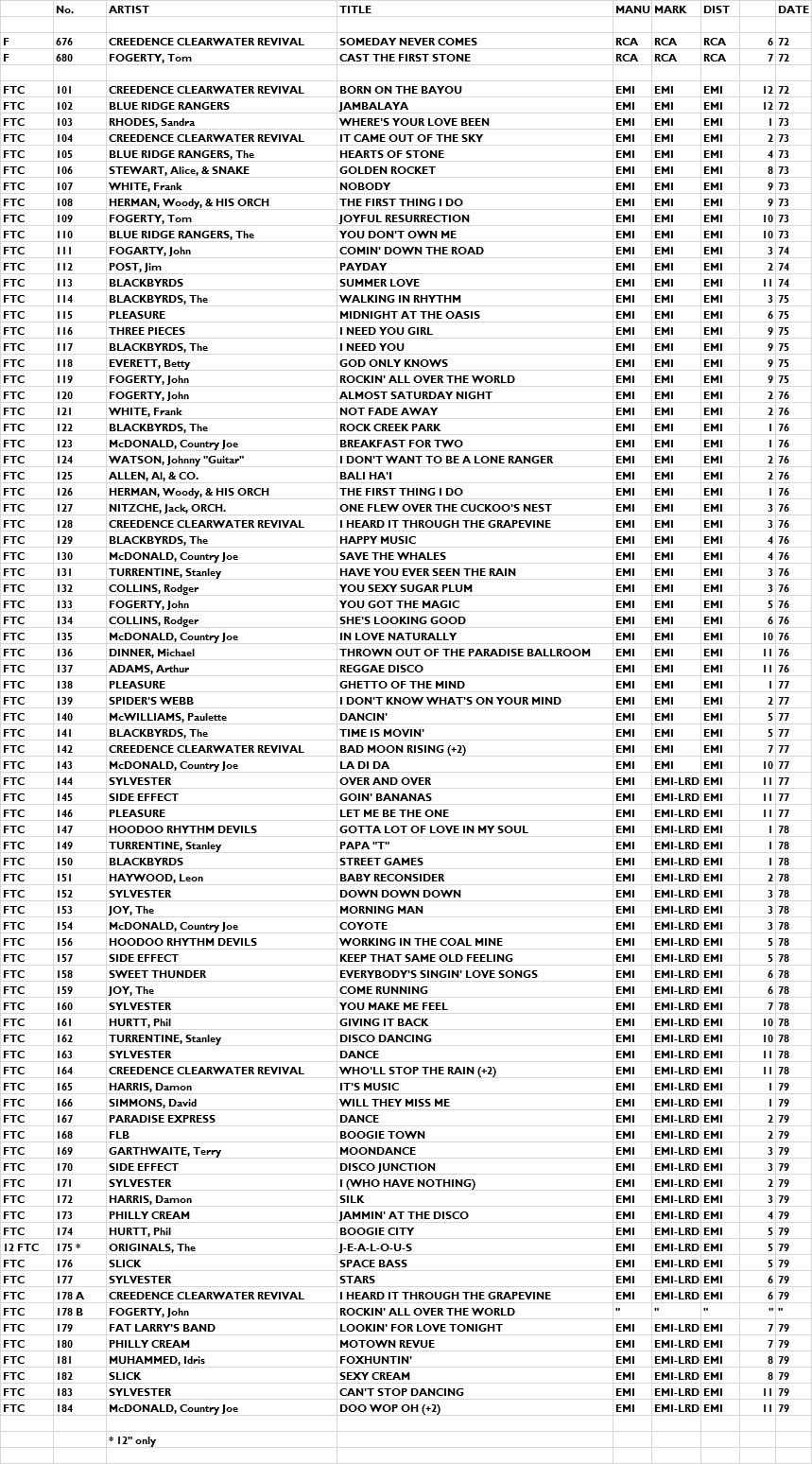


Copyright 2006 Robert Lyons.

